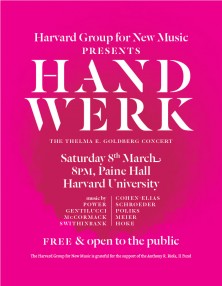 The question of gender inequity in classical music is hardly a new one and just a few days ago, Alex Ross posted in the New Yorker including some more recent upsetting comments from Russian conductors about their female counterparts. Meanwhile in the francophone world, there has been heated debate about remarks made this week by Bruno Mantovani, composer and — more importantly in this context — director of the Conservatoire National Supérieur de Musique et de Danse de Paris, in an interview with France Musique:
The question of gender inequity in classical music is hardly a new one and just a few days ago, Alex Ross posted in the New Yorker including some more recent upsetting comments from Russian conductors about their female counterparts. Meanwhile in the francophone world, there has been heated debate about remarks made this week by Bruno Mantovani, composer and — more importantly in this context — director of the Conservatoire National Supérieur de Musique et de Danse de Paris, in an interview with France Musique:
I won’t elaborate on my own feelings here, I’ve done that enough in other fora, but in the interest of this being available to those who don’t speak French, here is a translated transcript of his remarks (with thanks to Fabienne Séveillac for the French transcription):
I am a tiny bit… disturbed by all the talk about parity, or about positive discrimination. Er, there are few female conductors it’s true; there are few African conductors…
If we begin to deal with categories, we will have difficulty respecting the fact that there are standards, competitions and also ambitions that can be very different for a man or for a woman.
As you know, the aims of an orchestra director, of a conductor are complicated. We obviously encourage everyone to apply to join the conducting class so that we have as many conductors as possible to provide for French and international orchestras, but women aren’t necessarily interested, and neither can I put a bayonet behind every female student at the conservatoire, whether composer or instrumentalist, who might have the capacities for conducting, to force them to choose this career!
There is also the problem of maternity that raises its head; a woman… erm… who wants to have children… erm… will have a hard time having a career as a conductor, which can change tack abruptly overnight for several months…and then after having dealt with… I was going to say tastelessly the after-sales service of maternity, that is to say, raising a child at a distance, it isn’t simple, so you tell me that men are in the same situation, but despite everything, the relationship of a child to its mother is not that of a child to its father.
There is also sometimes even a physiological restraint… erm… the profession of a conductor is a profession that is particularly testing physically; sometimes women are discouraged by the very physical aspect: conducting, taking a plane, taking another plane, conducting again… is quite challenging, … so there is absolutely no negative discrimination, and it is for this that one might attack the conservatoire, the Opéra de Paris or I don’t know which institution, but I don’t know if there should also be a positive discrimination.
For me, the only discrimination, no matter in which discipline, is the entrance exam or competition.
This short clip sparked a lot of debate and today, feeling it necessary to explain himself, Mantovani used the CNSMdP Facebook page to issue a defensive, clarifying statement, which I translate below:
Where are the women in classical music? Continuation and end
Just as ‘there is no love, only demonstrations of love’, I think that there is no machismo, only demonstrations of machismo, or better still, that there is no anti-machismo, only demonstrations of anti-machismo. The interview I gave to France Musqiue as director of the Conservatoire National Supérieur de Musique et de Danse on the presence of women in the conducting profession has been creating controversy on social networks. It is first in my role as a composer that I would like to remind all those who are ready to participate in such easy public condemnation, that the author of these lines has dedicated four works to Laurence Equilbey, has recorded a CD with Susanna Mälkki, has requested that the Opéra de Paris engage this latter for his first stage work at the Bastille opera, and is currently working on a melodrama with Claire Gibault. There are only demonstrations, I said, and here are some irrefutable demonstrations, that should already be enough to silence the ill-informed prosecutors.
That being said, the idiotic and unfounded controversy concerning myself should not distract from an interesting debate, and here the director of the Conservatoire will be able to address the remarks exciting the blogosphere. (I take the opportunity to mention that the CNSMdP is one of the rare institutions of higher educations where one finds an absolute balance between male and female students.) I gave the journalist from France Musique around twenty minutes of interview time, of which they retained only one minute, and if it is impossible to have access to the entirety of that exchange, here is approximately what we touched upon.
The question of quotas of women in the conducting class was raised. First of all, I said that the conducting class has not been exclusively masculine for a long time. Several female students have completed their studies recently (most recently, Alexandra Cravero brilliantly completed her masters diploma in 2011 and was employed on an opera production at the CNSMdP the following year). In my opinion, a system of quotas in neither desirable nor appropriate at a school. It is the quality of candidates at the entrance exam that is important, not their sex, or their geographical origin. (Incidentally, people seem relatively rarely upset about the almost total absence of black or North-African conductors, something I for one find troubling.) It would be inacceptable to put in place the least discrimination at the entrance exam stage, be it positive or negative.
That said, I am delighted by the entrance into the preparatory class for conducting (known as ‘initiation’) of two young women for the academic year which is beginning, and I really hope that they will be able to enter the advanced class at the end of their current course.
During the interview, I also stressed the fact that many women are not interested in the conducting profession, and that the encouragement of an institution has its limits. One cannot force a person to engage with one career or another.
Regarding the potential reasons for this lack of interest (and I stress the adjective ‘potential’, because — not being a woman myself — my remarks are at once a personal opinion, but also a synthesis of statements made by women), I mentioned maternity, a question that often poses itself at the same time as a conductor’s career is beginning (between 27 and 35 years old). With the ‘service après-vente’ [after-sales service, or customer service] of maternity (an unfortunate turn of phrase, I admit, but it is also admissible to have a sense of humour when discussing serious subjects), I said that only with difficulty could a mother combine an international career as a conductor (very different from the level of involvement of an instrumentalist, because playing a concerto or a recital does not involve a week of rehearsals) with a recent birth. The relationship of a child to its mother is not the same as that to its father and denying this from behind an angelic egalitarianism is rather distant from reality.
Finally, and this is surely the most important, I repeatedly stressed the fact that the situation has already evolved a lot. Who could have imagined 20 years ago that one day it would be a woman (Marin Aslop [sic]) who would conduct the closing concert of the Proms? Likewise, the fact that having conducted my ballet Siddharta, Susanna Mälkki was asked back to the Opéra de Paris, shows that the old, macho habits of certain orchestras have completely disappeared. Of course, we are far from parity, but once again, this idea has no relevance for me in the current state of affairs, and it is too early to be able to envisage it. But the optimism is real.
Putting me on trial for machismo (which gives rise to quite vile opinions concerning my person on social networks and which do no honour to those who hold them) is simultaneously unjust and unjustified. France Musique, a station in the Radio France group, is a channel linked to two wonderful orchestras where we cannot say that the balance of invited conductors is particularly well respected. This is normal for the time being, and the situation will no doubt evolve with time. In any case, whether it as a composer or as director of an institution of higher education, I hope to participate in the emergence of female conductors with efficiency and appropriateness, far from the ephemeral passion that excites sterile debates where anything goes, even the basest tawdriness.
Bruno Mantovani
Director of the Conservatoire National Supérieur de Musique et Danse de Paris
While on this topic, composer Clara Iannotta draws my attention to the following document produced by the Société des Auteurs et Compositeurs Dramatiques: ‘Où sont les femmes ?’ (PDF). It is an impressively comprehensive survey documenting gender (im)balances in a variety of theatre and opera contexts in France. Collaborations with female artists at various French institutions regularly account for less than 15% of that organisation’s work.
6 October, 8pm: The translations have been revised in a couple of small details after some feedback.
 On Saturday, 8 March, Cologne-based ensemble hand werk are giving the first of the Harvard Group for New Music’s concerts for the year. In a mammoth programme that includes works by my colleagues here Sivan Cohen-Elias, Marta Gentilucci, Justin Hoke, Tim McCormack, Manuela Meier, Marek Poliks, Ian Power, and Sabrina Schroeder, they will play my trio The Incredulity of St Thomas. Many thanks go to Heather Roche, Niklas Seidl, and Jonathan Hepfer for all their hard work and also to the HGNM team for making this happen.
On Saturday, 8 March, Cologne-based ensemble hand werk are giving the first of the Harvard Group for New Music’s concerts for the year. In a mammoth programme that includes works by my colleagues here Sivan Cohen-Elias, Marta Gentilucci, Justin Hoke, Tim McCormack, Manuela Meier, Marek Poliks, Ian Power, and Sabrina Schroeder, they will play my trio The Incredulity of St Thomas. Many thanks go to Heather Roche, Niklas Seidl, and Jonathan Hepfer for all their hard work and also to the HGNM team for making this happen.

 I have recently joined the PhD programme at
I have recently joined the PhD programme at 


